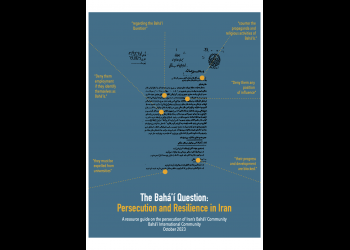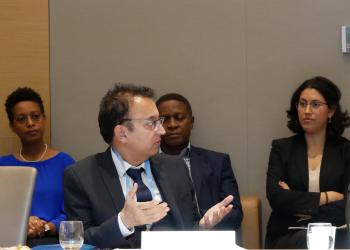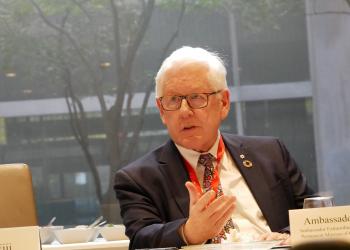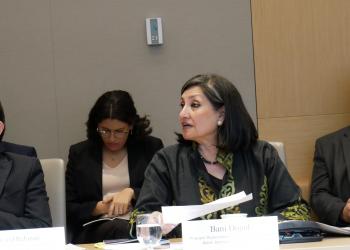New edition of “The Baha’i Question” addressing 44 years of persecution launched in New York
A new edition of “The Baha’i Question: Persecution and Resilience in Iran,” has been launched by the Baha’i International Community (BIC) at its United Nations Office.
Two United Nations Special Rapporteurs, Javaid Rehman and Nazila Ghanea, and Canada’s Ambassador to the UN, H.E. Robert Rae, spoke at the launch event, which included UN Member States’ senior diplomats from several regions and civil society representatives.
The document—which takes its name from a 1991 memorandum signed by Iran’s Supreme Leader Ali Khamenei, which addresses the “Baha’i question” and instructs that the “progress and development” of Iranian Baha’is should be “blocked”—will now be shared with UN agencies, government officials around the world, human rights defenders, journalists and academics.
For 44 years, since Iran’s 1979 Islamic Revolution in Iran, the Baha’i community there has faced severe persecution. Baha’is have been executed, their properties have been seized, they have been denied their right to education, denied livelihoods, subject to constant hate speech, and even denied the right to be buried in dignity.
“The Baha’i Question publication explores several implications of the 1991 memorandum,” said Bani Dugal, Principal Representative of the Baha’i International Community to the United Nations, “including the historical and religious motives of the persecution faced by Baha’is in Iran, the legal and practical methods employed by the Iranian government, the response of the Baha’i community, and how the international community can support the Baha’is.”
“Baha’is in Iran and around the world love Iran, and its people, and see the country as the cradle of their Faith. But from the outset the Faith has been seen as a threat … yet Baha’is neither succumb in resignation, nor do they take on the characteristics of their oppressors,” Ms. Dugal added.
H.E. Ambassador Robert Rae of Canada, whose country sponsors an annual resolution at the United Nations General Assembly on the human rights crisis in Iran, said that the persecution faced by the Baha’is stood in contrast to the principles and actions of the community.
“It’s crystal clear that religious minorities continue to face discrimination, persecution, harassment unjustly because of their religion or belief,” Ambassador Rae said, even as Baha’i teachings “are based on peace, unity, on diversity being transcended by common humanity; a religion that began to express itself in Iran a couple hundred years ago, and has been able to attract new members and followers throughout the world including in my home country in Canada.”
“The issue of the freedom of religious expression inside of Iran and Iran’s consistent refusal to accept the need for pluralism … is an extremely important aspect of how you measure freedom in a country,” Ambassador Rae said.
Javaid Rehman, the UN Special Rapporteur on the human rights situation in the Islamic Republic of Iran, said at the launch that “hope is the last thing we should give up.”
“I am hopeful … the Iranian people are a tremendous people [and] there is so much that Iran could offer. Given the opportunity, with the people of Iran, the country could be a beacon of human rights, progress, development and inspiration for the rest of the Middle East and for the rest of the world,” Mr. Rehman said.
The BIC hopes the document—described as a “resource guide” on 44 years of systematic persecution by the Iranian government of the country’s Baha’i religious minority—will raise added awareness of the persecution of Baha’is by the Iranian government and to hold it to account.
Nazila Ghanea, UN Special Rapporteur on the freedom of religion or belief, added that “The Baha’i Question” as a publication “is a lesson on how to document human rights.”
“The sheer persistence of the government of Iran’s policy is the outlandish and false claims that they keep bringing out of the bag in an effort to justify persecution of the Baha’is,” Ms. Ghanea added, referring to evidence included in the publication. We need to communicate clearly and convince new and younger generations to inform and impress upon them the severity and history of the persecution of the Baha’is in Iran. Especially in these days of false news, we can’t assume that the history is well understood.”
“The persecution may be approaching its 44th year, but we cannot normalize it, or see it as symptomatic of Iranian culture and reality. It is not Iran’s future,” Ms. Ghanea said.
The 2023 edition of “The Baha’i Question: Persecution and Resilience in Iran,” can be seen at this link on the Baha’i International Community’s website.









